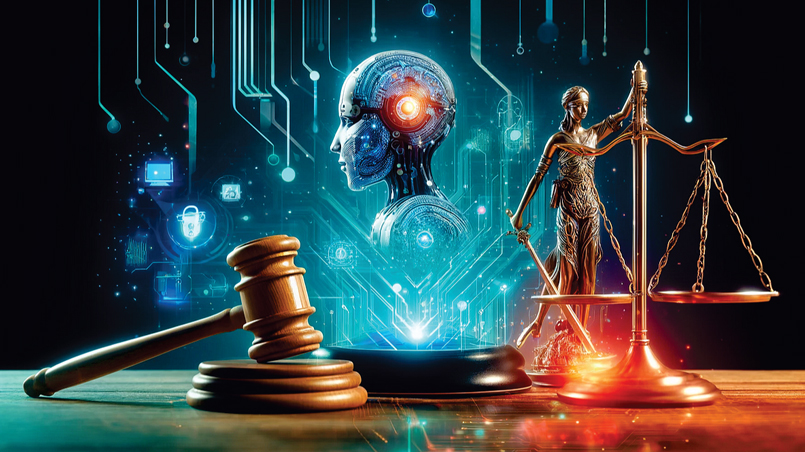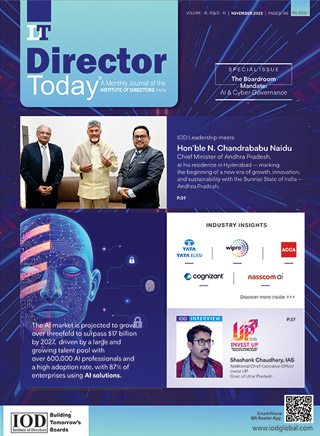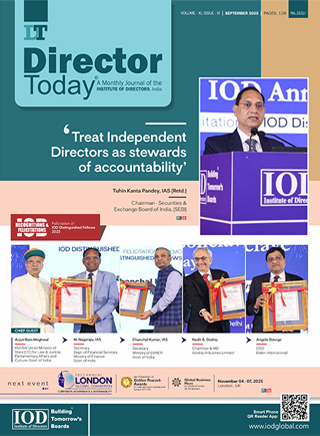ScalingUp Governance in AI Era

Artificial Intelligence is no longer merely a technological tool; it has become a transformative force redefining the fundamental structure, financial health, and oversight mechanisms of the modern corporations. As AI begins to influence strategic decisions and investment priorities, Independent Director must broaden their skills and vision beyond Financial Statements to AI led investments and its alignment with long term corporate goals.
Concerns around job displacement, unchecked automation, and the need for vigilant human oversight have come to the forefront. The recent Deloitte case, which led to a flawed Ai-assisted reports and a subsequent refund of approximately USD 4,00,000 to Australian government, underscores the risks of overreliance on automation. Striking the right balance between innovation, accountability, and ethical oversight has, therefore, become a defining responsibility for today's Independent Directors.
AI, Independent Director and Governance
The rapid adoption of AI and Generative AI (GenAI) significantly impacts Corporate Governance. In this dynamic evolving landscape, an Independent Director should provide objective judgments overseeing the interests of all stakeholders. The rise of AI calls for heightened cautions, particularly in the Indian regulatory landscape, including the Digital Personal Data Protection (DPDP) Act, 2023, and the focus on Data Sovereignty.
The rise of AI calls for heightened cautions, particularly in the Indian regulatory landscape, including the Digital Personal Data Protection (DPDP) Act, 2023, and the focus on Data Sovereignty.
• AI Governance Framework: The complexity of AI requires an updated governance framework to ensure that decisions are transparent, explainable, and ethical. This framework should manage risks such as data security, vulnerabilities and potential regulatory breaches. The DPDP Act emphasises lawful and fair processing, adherence to emerging AI Governance Frameworks proposed by the Govt. of India, which will define high-risk AI and set standards for safety, accountability, and ethical use, and as an Independent Director, it is important to know these regulations.
• Data Sovereignty: This is one of the biggest challenges for companies where the government mandates requiring critical or sensitive personal data processed by AI must reside within India. In this context the IDs must verify the company's data architecture and review contracts with third-party AI or Cloud providers (both Indian and foreign) to ensure full compliance with data residency requirements.
• Transparency and Accountability: AI-powered automation in reporting ensures that data is accurate and available in real-time, increasing the transparency and accountability of corporate boards and management. But for this to happen, the IDs must ensure that a formal system of human oversight is in place for all AI-driven material decisions to prevent blind reliance on the technology. If the organisation is designated as Significant Data Fiduciaries (SDF) under the DPDP Act, the Independent Directors must ensure compliance with enhanced obligations, including appointing a Data Protection Officer (DPO) and conducting a regular Data Protection Impact Assessments (DPIAs), specifically for AI use cases.
• Regulatory Compliance: AI automates regulatory monitoring and due diligence, ensuring timely compliance with the increasing complex regulations, thus mitigating significant legal and financial risks. For this to happen, the IDs must be acutely aware of the potentially high financial penalties for non-compliance with the DPDP Act. A failure in an AI system to protect personal data can lead to massive fines levied by the Data Protection Board of India. RBI, SEBI, and Sectoral Mandates that beyond the DPDP Act, the ID should monitor sectoral regulators (e.g., RBI's framework for responsible AI in the financial sector) and ensure that the company's AI governance is aligned with all industry-specific mandates.
Scaleup Infratech with their Micro Data Center
How does Scaleup Infratech empower Independent Directors to strengthen governance in an era defined by AI-driven complexities?When we founded ScaleUp Infratech, our vision was simple – to bring India's data back home. We asked ourselves: how we help organisations reign control over their IT budgets and digital assets? If data is the new oil, shouldn't the refinery be in the hands of its rightful owners?
Today, most enterprises operate on the cloud yet almost all of these platforms are owned by foreign hyperscalers. For many CIOs, nearly half of their cloud spend remains opaque, with little clarity or control. And when they seek alternatives, the options are limited. It was to address this challenge that we introduced the Micro Data Center a solution rooted in the principles of Data Sovereignty, Make in India, and Control over Data and Spend. ScaleUp Infratech is not merely a technology initiative; it is a movement towards reclaiming digital autonomy and ensuring governance keeps pace with the AI revolution.
What is ScaleUp Micro Data Center (MDC) and What it brings?
MDC refers to a small, modular, and localised data center facility deployed anywhere within your premise and placed closer to the data source or end-user It is a fully plug-n-play data center, operational in minimal time (a couple of days) with complete Tier-III data center framework. The Independent Directors (IDs) should view the investment in a ScaleUp MicroData Center not just as an IT cost, but as a Governance and Compliance Shield critical for navigating India's unique AI and data landscape. The investment provides the physical infrastructure that underpins the company's ability to fulfil its fiduciary and ethical duties in the ever-evolving Digital Era, especially concerning the Data Sovereignty mission of India.
ScaleUp MicroData Center: A Governance Imperative for the Independent Director
| Directors' Strategic Concern | How ScaleUp AI Investment Addresses It | Correlation to Strategic Objective & ID Governance Improvement |
| Long-Term Competitiveness | Provides the high-performance, low-latency computing backbone essential to develop and deploy proprietary, advanced AI models that create a sustained competitive advantage. | Future-Proofing the Business: The ID ensures the company has the foundational Compute Sovereignty to build Make-in-India AI models. This local capability is key to developing AI that is culturally, linguistically, and ethically aligned with the Indian context, a core principle of India's national AI vision. |
| Operational Agility & Speed | Enables real-time AI at the point of action (Edge AI), allowing the business to rapidly adapt to market changes, optimise supply chains instantaneously, and deliver hyper-personalised customer experiences. | Achieving Operational Excellence (with Accountability): The ID uses this infrastructure as a basis for demanding real-time governance. Faster compute allows for continuous monitoring of AI systems, enabling immediate detection and mitigation of algorithmic drift or bias, a crucial part of AI Governance Frameworks to prevent unfair or discriminatory outcomes. |
| Return on Investment (ROI) | The investment is targeted and measurable. It underpins high-value AI use cases (e.g., predictive maintenance, fraud reduction, new product development) which can be tracked with clear financial metrics EBITDA improvement, new revenue. | Ensuring Financial Stewardship (with Due Diligence): The ID ensures the significant capital expenditure is justified by clear, profitable use cases. Critically, the investment minimizes the long-term risk of relying on expensive, foreign cloud processing, thus securing the company's data economics and maximizing shareholder value by mitigating future regulatory cost burdens. |
| Risk Management & Governance | By localising compute power and data, the infrastructure helps manage risks related to data security, data sovereignty, and network reliance, while the high-performance nature supports ethical AI systems that require rigorous, constant monitoring. | Upholding Fiduciary & Ethical Duty (DPDP & Data Sovereignty): This is the ID's most direct correlation: The MicroData Center physically ensures regulatory compliance. It provides tangible evidence that: 1. Data Sovereignty is maintained by keeping critical processing and data within India's legal jurisdiction. 2. DPDP Act Compliance is secured by localizing the processing of Digital Personal Data. The ID can confidently assure the board that the risk of massive fines from the Data Protection Board of India due to data residency or crossborder transfer violations is significantly reduced. 3. Resilience is improved, protecting the company's operations from external network disruptions, a key aspect of operational risk oversight. |
Conclusion
As an Independent Director, your primary role in the age of AI is to ensure that the pursuit of innovation and efficiency is balanced with an uncompromising commitment to Responsible AI, Ethical Governance, and Regulatory Compliance especially protecting the rights of data principals as mandated by the DPDP Act and upholding the nation's strategic goal of Data Sovereignty. Let us ScaleUp the Governance with ScaleUp's Micro Data Center.
Author

Mr. Pranav Sharma
He is a seasoned IT operations leader with over 25 years of global experience in building and managing complex technological infrastructures. He is also a Certified Independent Director. As the Chief Operating Officer of ScaleUp Infratech, he is at the forefront of innovation, specialising in AI-powered Sustainable Data Center Solutions that align with India's national vision for a greener and more selfreliant future, as articulated in Viksit Bharat 2047 and Make In India.
Owned by: Institute of Directors, India
Disclaimer: The opinions expressed in the articles/ stories are the personal opinions of the author. IOD/ Editor is not responsible for the accuracy, completeness, suitability, or validity of any information in those articles. The information, facts or opinions expressed in the articles/ speeches do not reflect the views of IOD/ Editor and IOD/ Editor does not assume any responsibility or liability for the same.

 Quick Links
Quick Links
 Connect us
Connect us




 Back to Home
Back to Home






























